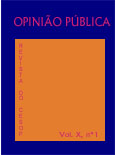Abstract
Boa parte das análises recentes do presidencialismo baseiam-se no pressuposto de que o confronto entre executivo e legislativo cria condições simultâneas para a estabilidade das políticas e para o rompimento do regime. Neste trabalho, mostro que há uma tensão lógica inerente entre essas duas predições e que elas se baseiam em pressupostos contraditórios. Em seguida, desenvolvo um modelo de impasse executivo-legislativo e sustento que a instabilidade do regime é mais provável quando atores partidários são unilateralmente impacientes, quando o desenho institucional é inclinado a favor de um partido e quando o número de partidos é maior. Na terceira seção, testo as predições do modelo usando dados de cortes transversais em séries no tempo para dezenove países do hemisfério ocidental entre 1950 e 2000. Por fim, discuto como essa abordagem ilumina alguns enigmas empíricos, como a sobrevivência histórica do presidencialismo americano e os baixos níveis de instabilidade do regime criados por impasses executivo-legislativo na América Latina na década de 1990. Palavras-chave: presidencialismo, estabilidade, regime, América Latina.
Abstract
Much of the recent analysis of presidentialism has been based on the assumption that executivelegislative confrontation creates simultaneous conditions for policy stability and regime breakdown. In the first section of the paper, I show that there is an inherent logical tension between these two predictions and that they rely on contradictory assumptions. In the second section, I develop a model of executivelegislative deadlock and argue that regime instability is more likely when partisan players are unilaterally impatient, when institutional design is biased in favor of one party, and when the number of parties is greater. In the third section, I test the predictions of the model using time-series cross-section data for 19 presidential countries in the Western Hemisphere between 1950 and 2000. Finally, I discuss how this approach illuminates some empirical puzzles like the historical survival of American presidentialism and the lower levels of regime instability created by executive-legislative deadlock in Latin America in the 1990s.
Keywords: presidentialism, stability, regime, Latin America.
References
ALTMAN, David. The Politics of Coalition Formation and Survival in Multi-Party Presidential Democracies - The Case of Uruguay, 1989-1999. Party
Politics, 6 (3), p. 259-283, 2000.
AMES, Barry. The Deadlock of Democracy in Brazil. Ann Arbor: The University of Michigan Press, 2001.
AMORIM NETO, Octavio. Presidential Cabinets, Electoral Cycles, and Coalition Discipline in Brazil. In: MORGENSTERN, S. e NACIF, B. (eds.). Legislative Politics in Latin America. Cambridge: Cambridge University Press, p. 48-78, 2002.
BINDER, Sarah A. The Dynamics of Legislative Gridlock, 1947-96. The American Political Science Review , 93 (3), p. 519-533, 1999.
CHEIBUB, José Antonio. Minority Governments, Deadlock Situations, and the Survival of Presidential Democracies. Comparative Political Studies, 35 (3), p. 284-312, 2002.
CHEIBUB, José Antonio e LIMONGI, Fernando. Democratic Institutions and Regime Survival: Parliamentary and Presidential Democracies Reconsidered. Annual Review of Political Science, 5, p.151-179, 2002.
COX, Gary W. e MCCUBBINS, Mathew D. The Institutional Determinants of Economic Policy Outcomes. In: HAGGARD, S. e MCCUBBINS, M. D. (eds.). Presidents, Parliaments, and Policy.
Cambridge: Cambridge University Press, p. 21-63, 2001.
DAHL, Robert A. Polyarchy: participation and Opposition. New Haven: Yale University Press, 1971.
DION, Douglas. Evidence and Inference in the Comparative Case Study. Comparative Politics, 30 (2), p. 127-146, 1998.
EATON, Kent. Parliamentarism versus Presidentialism in the Policy Arena. Comparative Politics, 32 (3), p. 355-376, 2000.
JONES, Mark P. Electoral Laws and the Survival of Presidential Democracies. Notre Dame: University of Notre Dame Press, 1995.
LINZ, Juan J. Presidential or Parliamentary Democracy: Does it Make a Difference?. In: LINZ, J.J. e VALENZUELA, A. (ed.). The Failure of Presidential Democracy. The Case of Latin America. Baltimore: The Johns Hopkins University Press, p. 3-90, 1994.
MAINWARING, Scott. Presidentialism, Multipartism, and Democracy - the Difficult Combination. Comparative Political Studies, 26 (2), p. 198-228, 1993.
MAINWARING, Scott. The Surprising Resilience of Elected Governments. Journal of Democracy, 10 (3), p.101-114, 1999.
MAINWARING, Scott; BRINKS, Daniel e PÉREZ-LIÑÁN, Aníbal. Classifying political regimes in Latin America, 1945-1999. Studies in Comparative International Development, 36 (1), p. 37-65, 2001.
MAINWARING, S. e SHUGART, M. S. Conclusion: Presidentialism and the Party System. In: MAINWARING, S. e SHUGART, M. S. (eds.). Presidentialism and Democracy in Latin America. Cambridge: Cambridge University Press, p. 394-439, 1997.
PÉREZ-LIÑÁN, Aníbal. Pugna de Poderes y Crisis de Gobernabilidad: ¿Hacia un Nuevo Presidencialismo? Latin American Research Review , 38 (3), 2003, no prelo.
PRZEWORSKI, Adam; ALVAREZ, Michael E.; CHEIBUB, José Antonio e LIMONGI, Fernando. Democracy and Development. Political Institutions and Well-Being in the World, 1950-1990. Cambridge: Cambridge University Press, 2000.
RAGIN, Charles C. Fuzzy-Set Social Science. Chicago: The University of Chicago Press, 2000.
RIGGS, Fred W. The Survival of Presidentialism in America: Para-Constitutional Practices. International Political Science Review, 9 (4), p. 247-278, 1988.
RUSTOW, Dankwart A. Transitions to Democracy: Toward a Dynamic Model. Comparative Politics, 2 (3), p. 337-63, 1970.
SEAWRIGHT, Jason. Testing for Necessary and/or Sufficient Causation: Which Cases are Relevant? Political Analysis, 10 (2), p. 178-193, 2002.
SHUGART, Matthew S. e CAREY, John M. Presidents and Assemblies. Constitutional Design and Electoral Dynamics. Cambridge: Cambridge University Press, 1992.
STEIN, Ernesto; TALVI, Ernesto e GRISANTI, Alejandro. Institutional Arrangements and Fiscal Performance: The Latin American Experience. In: POTERBA, J. M. e HAGEN, J. V. (eds.) Fiscal Institutions and Fiscal Performance. Chicago: The University of Chicago Press, p. 103-133, 1999.
TSEBELIS, George. Decision Making in Political Systems: Veto Players in Presidentialism, Parliamentarism, Multicameralism, and Multipartyism. British Journal of Political Science, 25 (3), p.289-325, 1995.
TSEBELIS, George e MONEY, Jeannette. Bicameralism. Cambridge: Cambridge University Press, 1997.
VALENZUELA, Arturo. Party Politics and the Crisis of Presidentialism in Chile: A Proposal for a Parliamentary Form of Government. In: The Failure of Presidential Democracy, Vol. 2, p. 91-150. The Press, 1994.
WEYLAND, Kurt. The Politics of Market Reform in Fragile Democracies: Argentina, Brazil, Peru, and Venezuela. Princeton: Princeton University Press, 2002.
THE WORLD BANK. World Development Report 2002. Building Institutions for Markets. Oxford: Oxford University Press, 2002.
A Opinião Pública utiliza a licença do Creative Commons (CC), preservando assim, a integridade dos artigos em ambiente de acesso aberto.

